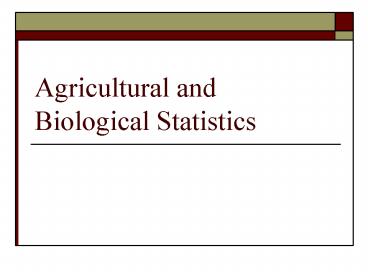Agricultural and Biological Statistics - PowerPoint PPT Presentation
1 / 18
Title:
Agricultural and Biological Statistics
Description:
Cost of an auto before airbags and other safety features and those produced today. ... Statistics cannot be used to infer causation from correlation. ... – PowerPoint PPT presentation
Number of Views:121
Avg rating:3.0/5.0
Title: Agricultural and Biological Statistics
1
Agricultural and Biological Statistics
2
Introduction to Statistics
- Chapter 1
3
What is Statistics?
- Statistics provides the basis for investigations
in many fields of knowledge, such as social,
physical and biological sciences, engineering,
education, business, medicine and law. - Information is acquired in the form of numbers,
data.
4
What is Statistics?
- An analysis of this data is made to obtain a
better understanding of the phenomenon of
interest, and some conclusions may be drawn.
5
What is Statistics?
- Definition of Statistics making sense of
figures (numbers). It is the methodology which
scientists and mathematicians have developed for
interpreting and drawing conclusions from data.
6
What is Statistics?
- Statistical Inference refers to a process of
making informed decisions. - In statistical inference it is common to collect
observations on a few items (a sample), analyze
them using a well known procedure, and then infer
that since the findings obtain (are the case) for
the sample, they must obtain for all the items
(the universe) or population.
7
Examples of This Process
- Determining who won an election even before the
polls close. - Determining the average life of light bulbs even
before they are produced. - Determining the quality of an equestrian safety
helmet that wont be tested. - Determining the quantity of corn flakes in a 64
oz. box. - These things involve inductive logic.
8
Common Misuses of Statistics
In our everyday life we are bombarded with
presentations supported by statistics
- Bias quoting statistics to prove the
superiority of a product, competitors seem to be
using other statistics to prove the opposite. - Data could be biased.
- Poor questionaires
- Leading questions
9
Common Misuses of Statistics
- Faulty Generalizations - when one tries to say
using statistics that the data has a certain
meaning. - Sample size too small types of fish in lake
taken from a sample of five. - Samples that are non typical respondents not
typical or random from population.
10
Common Misuses of Statistics
- Faulty Deduction What is true for the whole is
not true for the individual. - 60 of the trees in the US are Oak
- This wouldnt be true for the south would it?
11
Common Misuses of Statistics
- Noncomparable Data Comparisons made between
items that arent really alike. - Cost of an auto before airbags and other safety
features and those produced today. - This creates a problem with price indexes because
the technology to produce autos is constantly
changing.
12
Common Misuses of Statistics
- Errors in Semantics Slanted or colored words
being used to influence the respondent. - You dont really like this product, do you?
- Questions that suggest an answer.
13
Common Misuses of Statistics
- Assuming Causation from Correlation
- If one thing precedes another in time then it is
assumed that it (the first) causes the other (the
second) - Get wet Catch cold
- Wintertime Stay indoors Catch cold
- A and B fluctuate together (A and B are
correlated) - It may be that A causes B or B A or that C causes
both A and B or that the correlations are due to
chance.
14
Assuming Causation from Correlation
- Statistics cannot be used to infer causation from
correlation. All statistics can say is that the
factors move together in some fashion.
15
Common Misuses of Statistics
- Oversimplification
- Sales have increased 125
- What is missing?
- Time Frame
- Advertisers use this technique
16
Common Misuses of Statistics
- Spurious Accuracy
- Answers generated with a large number of trailing
decimals. - If data is accurate to the nearest 100, an
average should be presented to the nearest 100.
17
Statistical Analysis
This is the whole process of organizing,
processing, summarizing, and drawing
conclusions from the data. In statistical
analysis, methods of description and methods of
analysis combine.
18
Statistical Analysis Flow Diagram
For a Sample
For a Population































